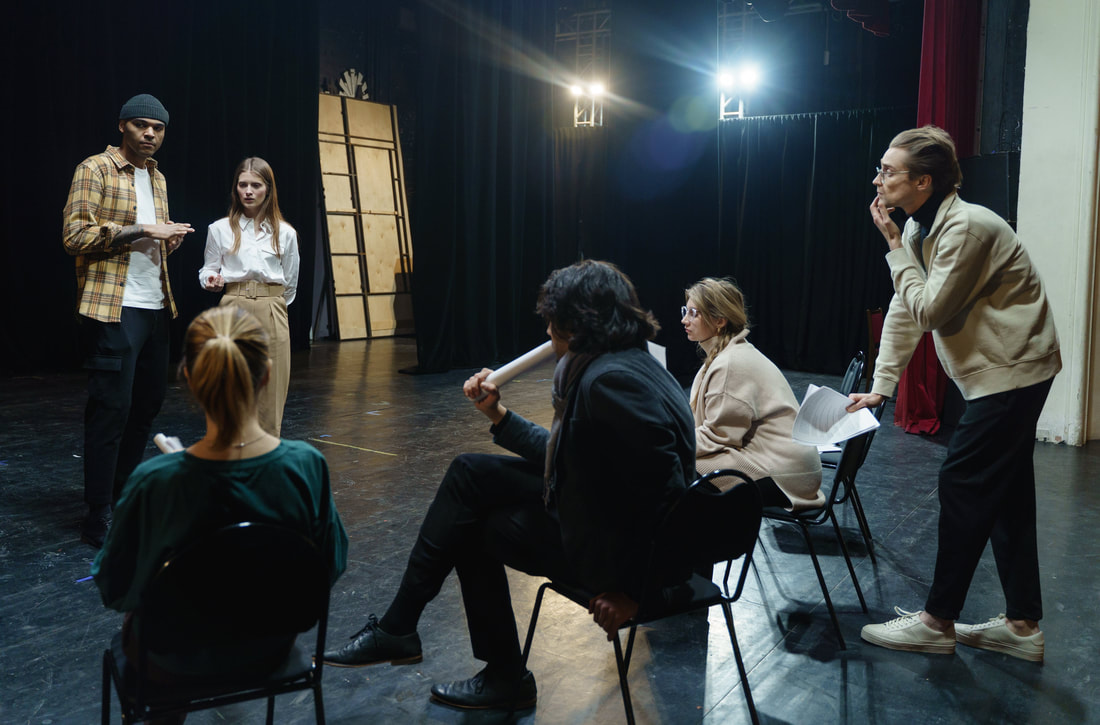|
‘To understand is to perceive patterns.’ (Isaiah Berlin) According to Gestalt psychology, human beings are hard-wired to see things in patterns. Take, for instance, a tree. If I were to invite you to imagine a tree, it’s likely you would imagine the whole tree (well, at least that part of the tree that is visible above ground). I wouldn’t imagine that you’d picture all its constituent elements separately – cells, leaves, twigs, branches etc. Unless you’re dissecting a tree in a botanical lab. It’s essentially the same idea in music. When we listen to a melody, we hear the tune as a whole, not each individual note separately from the others. In fact, if we were to examine each note in turn in isolation, it’s unlikely we’d be able to discern what melody they form part of when clustered together in a specific configuration. Except, perhaps, if we’re learning to play an instrument and focusing intently on one note at a time. Now this intuitive ability can be a real gift when working with teams, groups, organisations – or even making sense of geopolitics. It means learning to step back from the immediate issue or event and, metaphorically, to narrow our eyes into a near-squint to allow a bigger picture, a wider system, a deeper meaning, the wood for the trees, to emerge. Khalil Gibran observed, ‘the mountain is clearer to the climber from the plain.’ I recognised this phenomenon at work this last week when, in the Netherlands for the first time, the more I relaxed and allowed the language to flow over me, the more of it I could understand. When I paid too much attention to individual words, the more I got stuck. There are parallels in Timothy Gallwey’s Inner Game. Beware paralysis of analysis. Take a breath, relax your grip and notice what surfaces into awareness.
10 Comments
‘Coincidence doesn't happen a third time.’ (Osamu Tezuka) I arrived in the Netherlands on Saturday, aiming to orientate myself briefly to this new country before working with an INGO team there on Monday. When I stepped into my hotel room, however, it smelt damp and sweaty. Trying not to breathe, I opened the windows to an icy blast and decided to go for a walk while the fresh air did its work. Not far away, I noticed a church building so walked over to have a glance at its meeting times. As I did so, I looked up and saw a cross in the sky, a misty symbol painted momentarily on blue canvas by vapour trails. It felt significant, but I didn’t know why. The next day, the church was full when I arrived and I sat quietly in the midst, happily surprised by how much Dutch I could understand. (I can speak German, but this was my first time to read this new language). At the end, a woman kindly introduced herself to me. On learning that I am English, she explained that the church is recovering from an intensely painful internal conflict. The pastor had spoken on a need to look to God. I showed her the photo I had taken the day before – a symbol of suffering and hope – and she started to weep. ‘God brought you here to us this morning, Nick.’ Another woman now introduced herself, explained briefly that she had worked internationally in medical mission, and invited me to a special meeting that afternoon for asylum seekers and refugees. ‘How could she possibly have known anything about my life and work?’ I asked myself, a total stranger. The guest speaker that day was a visitor from Algeria and, serendipitously, works for the same organisation I was about to work with the following day... as does a man who randomly found himself sitting beside me in a hall full of people. Was this all coincidence? I don’t believe so. You decide. ‘People get tired of asking you what's wrong and you've run out of nothings to tell them. You've tried and they've tried, but the words just turn to ashes every time they try to leave your mouth. They start as fire in the pit of your stomach but come out in a puff of smoke. You are not you anymore. And you don't know how to fix this. The worst part is...you don't even know how to try.’ (Nikitta Gill) Losing my voice was a painful experience. It started with frequent sore throats and laryngitis but steadily got worse. After a while, I had to suck on throat lozenges to be able to speak at all. My voice became very weak and, if I had to project it in a group or tried to sing, it felt afterwards like I’d been garrotted. Feeling increasingly concerned, I saw my doctor who referred me to ear-nose-throat specialists. They ruled out throat cancer and vocal cord nodules yet still couldn’t work out what was causing the problem. I lost count of how many cameras they ran up my nose and down my throat. As time went on with no improvement, they referred me to speech therapy. By now I was having to carry a sign at work to say, ‘Sorry, I’ve lost my voice’ and a clipboard to write down what I wanted to say. (It was amusing to see how many people wrote down their responses for me to read too. I had after all lost my voice, not my hearing.) The speech therapists were puzzled by the symptoms and tried various techniques without success. For 2 years, I virtually couldn’t speak at all. It took another 10 years of cameras and speech therapy before they finally worked out the underlying problem. Bizarrely, I had somehow learned to speak as a child without using the complex muscles around the larynx correctly. It was, in effect, as if I had found a way to imitate normal speech. That was OK to a point, until my work demanded more strenuous use of my voice. That’s when it became strained and failed. Apart from the intense physical discomfort, the social and psychological effects were profound. Over the years, I got tired of explaining my predicament. I became far quieter than usual and people related to me as if I was incredibly introverted, or simply didn’t relate to me at all. It became so very isolating. Not only did I lose my physical voice. I felt steadily as if I was losing my personal identity, presence and influence in social situations too. I felt helpless to resolve it and had no idea if it could or would ever be resolved. Salvation came in the form of a new friend, David, whom I met in a church and who had suffered from debilitating hearing loss for many years. When he described the social and psychological effects it had had on his life, for the first time I didn’t feel alone. It demonstrated the power of empathy and its place in healing. Now I could learn to speak. ‘We don’t have a plane crash scheduled for today, but I thought I’d take you through the emergency procedures just in case.’ (KLM Air Hostess) I love the difference that a sense of humour can make. The air hostess (above) made everyone laugh during the passenger safety briefing on a return flight from the Netherlands today. The airline’s own plane had experienced maintenance problems so it had had to borrow one from another airline. One hostess complained, with a glint in her eye, that the green décor didn't match the blue colour of her uniform. The passengers all laughed when another hostess made an announcement too, aiming to draw our attention to an apparent information light on the plane…only to correct herself moments later with, ‘Oh – this plane doesn’t have one!’ Brilliant. It took the terror out of the turbulence. On a more serious note, I had been in the Netherlands to work with a diverse NGO leadership team, to support its desire to enhance its international teamwork. I referenced briefly a couple of places in the Bible where the writer comments on the amazing potential of human diversity – where the Divine whole is seen, known and experienced to be more than the sum of its parts – yet also hints at the corresponding dark risks of undervaluing, fragmentation and conflict if not. Strikingly, the writer moves on in both places to emphasise a deep need for authentic love as the critical success factor. This insight set a spiritual-existential tone for the day, as we reflected on team-as-relationships. Returning to the plane – but this time as a metaphor, a participant from South Africa asked, ‘How many separate parts is a Boeing 747 aircraft made up of?’ Apparently, the answer is about 6,000,000. ‘And what do these diverse components all have in common?’ Puzzled faces all round now. ‘None of them can fly.’ I thought this was genius. What a great way to dispel the myth of the all-sufficient self in the face of the dynamic complexities of teams, organisations and wider world. We worked through an Appreciative Inquiry next, drawing on positives of the past and aspirations of the present to co-create shared trust and vision for the future. Set the trajectory. Fasten seatbelts. Enjoy the flight. ‘You could start a fight in an empty room, mate.’ (Allan Jones) I’ve never sought conflict. Far from it. I much prefer harmony and peace. That said, however, I can’t escape a similar calling to that which Martin Luther King once heard: ‘Stand up for righteousness! Stand up for justice! Stand up for truth!’ It’s a call that burns deeply inside of me and has done, as far as I can remember it, for my entire life. I’m pained to admit that I haven’t always followed that voice anywhere near as courageously as MLK. I haven’t always handled it with his astonishing humility and love. I’ve stayed silent when I should have spoken up or spoken up when I should have stayed silent. My words have stumbled out clumsily. I’ve caused pain where I meant to bring healing and hope. Yet, at times, this vocational stance has proved authentic, valuable and worthwhile. In my 30s, I worked for a large UK charity in the health and social care sector. As an idealistic young radical, I challenged the leadership team on numerous occasions when I believed we were compromising our values. I tried to do this with prayer and humility and out of a genuine desire to build relationship and trust. On one occasion, the leadership team decided, in view of limited budget, to increase only senior leadership salaries until it had secured sufficient funding to increase frontline staff salaries too. I argued vociferously that we should do the exact opposite – and to freeze my own salary as a first step. On another occasion, the leadership team decided to reserve all spaces in its small head office car park for executives only, given that they didn’t have time to drive around to look for parking places elsewhere. I advocated passionately that, especially in the winter months, the spaces should be reserved for female and other vulnerable staff or visitors so that they wouldn’t have to walk along dark city streets at night to their cars. On yet another occasion, the leadership team recruited a ‘hatchet man’ on temporary contract to implement a tough restructure with associated redundancies. I protested that this blunt way of approaching the change would damage relationships, engagement and trust. At times, I imagined my challenges and counter-proposals were met with deafening silence or heavy sighs – especially as I wasn’t a senior leader at the time. Nevertheless, when a serious crisis broke out between the leadership team and entire middle management, both sides to the conflict invited me to mediate as ‘the only person they could trust’. The chief executive, a man of remarkable humility, took me into his confidence and treated me like a respected thought-partner. When I moved on, the company secretary wrote to me to say he had never encountered such integrity. Even the dreaded ‘hatchet man’ wrote that he wouldn’t hesitate to employ me alongside him in any future role. Pray with humility – take a stance – speak the truth in love. ‘Just like seasons change in nature, they change in our lives as well. And, as they change, they ask different questions of us. What questions is your life asking of you now?’ (Funmi Johnson) I had a great conversation with Funmi, a fascinating and inspiring fellow coach, this afternoon and found her question (above) very thought-provoking. I’m at an age where legacy is a persistent question that calls out to me with growing insistence…and demands a response. Am I genuinely living my life authentically according to the mission and values that I claim to be real and true? Or am I compromising too much of what matters most, deluding myself with a clever façade that even I have found convincing? How deep will my spiritual footprint be? I love Funmi’s question. It stirs the waters and ignites a search. ‘Try to be a rainbow in someone’s cloud.’ (Maya Angelou) I can’t create a rainbow. I can only witness its radiant beauty. A rainbow itself is created by white light, refracted as it strikes droplets of water in the air, often seen most vividly during or after rainfall. Some of the most stunning I’ve seen have been in Scotland where sunshine and rain are common together, with bright-coloured rainbows emerging like curvaceous, prismatic streamers in their midst. The Bible depicts rainbows as signs of spiritual-existential promise, of hope, initiated by God. Again, this isn't something I can make happen. I can only witness it, experience it, be awestruck by it. It’s something, or rather Someone, who clings to me amidst the violent storms, raging winds and torrential downpours of my life. Often, quite literally, this has been the only reason why I'm still alive today. Sometimes, I only perceive or discern the traces of a rainbow after the event. It’s like a mysterious pattern that appears, by faith, and is only visible from a distance. I went to theological school for 3 years. Inexplicably, my fees and living expenses were fully-paid. I remember, however, sitting on the side of my bed, alone and in near-despair. Studying God like studying physics felt like a travesty. Years later, the hidden seeds sown through that experience gradually came to fruition. I can now see the deep wisdom in that youthful decision, that strange prompt of divine opportunity that had felt so hard for me at the time. It was a period that had included a broken engagement, a snapped shin bone, tests for throat cancer and many other painful trials. Yet still, somehow...a rainbow appeared. ‘If you don’t appreciate your customers, someone else will.’ (Jason Langella) The restaurant came highly recommended and, as it was a special treat to eat out on this occasion, we had high hopes and expectations. The food was reasonable but the drinks were flat. We paid the bill and left, determined not to go there again. And therein lies one of the challenges for retailers in the UK. Many people are too polite to complain but they simply don’t return. ‘Was everything OK with the meal?’ ‘Yes, thank you.’ Big mistake. How about, ‘We hope you enjoyed your meal. In fact, we’ll give you a £5 discount off off your bill if you could suggest just 1 improvement for next time?’ That’s the way to do it. Take seriously the customer experience, elicit useful suggestions and increase the likelihood of a return. This resonates with what I heard at a Balanced Scorecards and Strategy Maps workshop. We were told that the CEO of supermarket giant Tesco doesn’t ask for reports on how many customers visit the stores, but how many come back. Repeat business. That’s the idea and it’s one of the purposes of loyalty cards: to see who returns. Remember too that just 1 unhappy customer can spread the news of a bad experience to other potential customers like wildfire. ‘For me, revolution simply means radical change.’ (Aung San Suu Kyi) I heard a well-known pop psychologist on the radio this week, talking about his new book about how to make your New Year’s resolutions stick. He invited the listeners to buy his book in order to learn more. I didn’t do that, but it did bring to mind a number of things I’ve noticed over the years as I work with people, teams and organisations. I will share a couple of insights here that may be of interest and useful – and I promise not to ask you to buy anything. The first is how hard it can be to make significant and sustainable changes to habitual patterns of thought and-or behaviour. A wise friend, Ian Henderson, illustrates this simply by inviting people to fold their arms. Next, he invites them to fold their arms in the opposite direction. (I found this harder than I had imagined). He goes on to invite them to reflect on what routine they always use to dry themselves after a shower. We are creatures of habit. That’s OK when the routines serve us and-or others well. If, however, people become trapped in, for instance, patterns of tension or stress, if often demands more than fresh thinking, determined effort or will-power to change it. So, here’s the second. Try disrupting the physical context in which it takes place; for instance: meet in a different room or location; use different chairs; sit in different places to where you normally sit; stand up rather than sit down. I worked with a team that felt trapped in conflict. They invited me to help them work through it so I asked that we hold our first meeting where and at the time at which they normally met. When we did so, I asked them where they normally sit, including in relation to each other. (‘Exactly where we are now’). At the next meeting, I changed the time and, before participants arrived, rearranged the room completely, then invited them to sit somewhere different. The shift in group dynamics was remarkable. Disrupting the times and room configuration created enough of a change to enable the team to hold a different spirit, style and type of conversation. This, in turn, helped team members to relax enough to consider and create new possibilities. It released the stuck-ness and enabled a breakthrough of sorts that wouldn’t have been possible by thinking or talking alone. (Like this idea? Look out for my new book…) ‘The currency of real networking is not greed, but generosity.’ (Keith Ferrazzi) One of the skills in Action Learning is to distinguish between a presenter who is wrestling with a question from one who has become completely stuck. In the former case, it’s often most useful simply to sit with the presenter in silence while the question does its work. In the latter, the facilitator may offer the presenter an option of ‘peer-consultancy’, if it might help break the mental deadlock. In order to do this well, however, and to ensure that ownership and agency remain with the presenter, the facilitator can follow a specific sequence of interventions and process steps:
A few words of caution. First, beware of introducing the peer-consultancy approach without checking in with the presenter first. If the presenter is deep in thought, such a shift in approach may feel premature of patronising, as if inferring that they’re unable to work out a solution for themselves. Second, beware of any formal or informal (e.g. age, gender, race) hierarchical dynamics in a group. Presenters may feel that they ought to respond to all insights out of respect for those who shared them, or obliged to agree with ideas proposed by someone they regard as an authority figure. |
Nick WrightI'm a psychological coach, trainer and OD consultant. Curious to discover how can I help you? Get in touch! Like what you read? Simply enter your email address below to receive regular blog updates!
|













 RSS Feed
RSS Feed